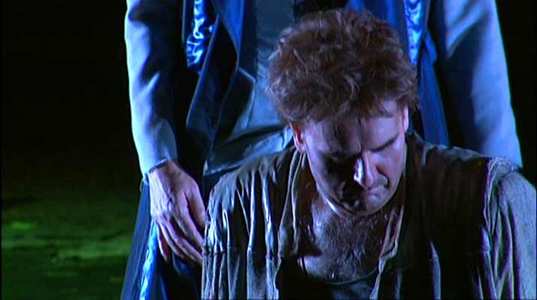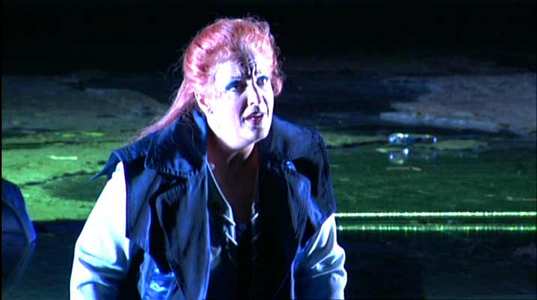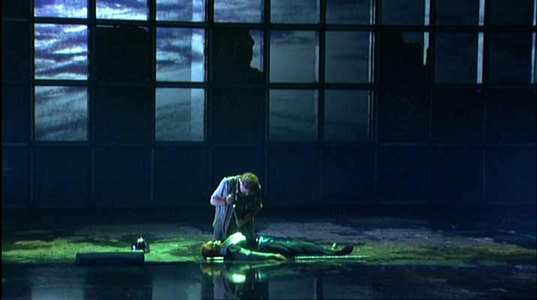Wagner: Siegfried (de Billy)
Introduction
The third part of Wagner`s epic cycle of music dramas, staged at Barcelona in 2004.
Act 1 introduces us to the eponymous hero for the first time in the cycle. He is the offspring of the incestuous relationship between Siegmund and Sieglinde, a brother and sister who themselves were born to an earthly woman, but fathered by the war god Wotan.
Siegfried is being `looked after` by the dwarf Mime in a foundry but has not learned anything of the forge himself, preferring to wander around the woods enjoying nature and hunting. He despises Mime anyway, as he firstly believes he`s his father but cannot see any resemblance between them. Eventually, he persuades the dwarf to reveal who he really is, and is shown the fragments of the sword which his father owned when he died.
Wotan appears (known as `The Wanderer`) and he and Mime riddle each other about life, the universe and everything. Mime fails to answer the god`s question which asked who would kill the dragon which guards the Ring that gives all-conquering power to the owner. The answer is the man who knows no fear (Siegfried). Eventually, Siegfried melts down the pieces of the broken sword and forges himself `Notung`, an even stronger weapon than the one first created by Wotan.
Act 2 takes place outside the dragon`s cave (the dragon being the transformed giant, Fafner, seen in `Das Rheingold`). The Wanderer and Alberich (Mime`s brother, and the first `owner` of the Ring) discuss the chances of the treasure`s recovery when Siegfried appears and the dragon wakes up, to be (fairly) swiftly despatched by his sword. Siegfried tastes the dragon`s blood and can suddenly understand the song that a bird has been singing to him. It tells him of the Ring, and various other treasures within the cave, of a warrior maiden (Brünnhilde) fast asleep on a mountain surrounded by fire, and also about Mime`s plot to kill him and take the treasure himself. Mime is similarly despatched.
Siegfried goes in search of Brünnhilde.
Act 3 takes place by, and on Brünnhilde`s mountain, where The Wanderer makes one last effort in preventing Siegfried from reaching her (although he knows he will fail). Siegfried shatters Wotan`s spear, destroying the god`s power, and makes his way up the mountain and through the firewall (easy to do with the right software I suppose).
He sees Brünnhilde lying there in her armour, and immediately falls in love with her once it has been removed and he realises she`s the woman he has been looking for. Brünnhilde at first tries to fight against the loss of her power and immortality but quickly succombs to Siegfried`s passion.

Video
The performance is presented in a region free 16:9 anamorphic transfer and NTSC format, and overall, the video quality is passable, although the stage lighting quite often produces a nasty glare.

Audio
The audio is LPCS stereo or DTS (the surround sound is more effective here), but the sound, much like `Die Walküre` in the same series, suffers from poorly placed stage microphones, which quite often allows the orchestra to drown the singers in the climaxes, especially when they`re not standing towards the front.

Features
Extras include an illustrated synopsis and cast gallery, with subtitles in English, French, German, Spanish, Catalan and Italian. The English translation often seems slightly archaic (probably taken from a piano reduction, which usually has the German and English settings) and is sometimes difficult to read against some of the brighter sets. The disc also includes a booklet which contains a short essay on the production in English, French, German and Spanish.

Conclusion
This is a very fine production of Siegfried, with some excellent sets (especially the forge in Act 1) which rise out of and back into the stage at will, and some decidedly unimpressive designs, notably the dragon, which resembles a mix between a lobster and Robocop.
The orchestra playing is much improved from `Die Walküre`, although still sounds a little rough and ready in places (the poor horns now have their Act 3 splits preserved for eve on DVD - but whoever played the horn call earlier on deserves a medal!). Bertrand de Billy`s pacing of the opera doesn`t produce too many dull moments, but some scenes needed to be pushed forward when he seemed to prefer the laid-back approach.
The highlight of the stage performances comes from Graham Clark (Mime) who, in amongst his athletic bounding all over the sets, brings the scorned and scheming character of the dwarf vividly to life and thoroughly deserved the ovation he gets after Act 2.
Falk Struckmann (The Wanderer/Wotan) produces another strong performance, but is more withdrawn, perhaps due to the character`s growing weakness, but at times sounds a little too harsh.
Deborah Polaski (Brünnhilde) only appears in Act 3, but Wagner throws some of his nastiest vocal writing at her from the start, and in the most part, she carries it off although there is some very careful placing of the high stuff. She`ll come into her own in Götterdämerung, I`m sure.
Günter von Kannen (Alberich) gives a dramatic rendition, but uses far too much vibrato for effect, and sounds strained in the climaxes.
John Treleaven (Siegfried) is a disappointment. He also sounds strained for most of the opera, sometimes cracking on the top notes, and overall there doesn`t seem much depth to his voice. To make sure I wasn`t going to be unfair, I watched a few scenes of Siegfried Jerusalem singing the same role in the James Levine `Ring` (from 14 years ago) and there`s really no comparison. This is a great shame, as he gives everything he has, and sounds rather good in the sword-forging scene, but despite being a strong presence on stage, he hasn`t the sort of voice to carry off this incredibly tough role.
So, an impressive production overall, but unfortunately let down by the principal singer. Perhaps the cameras were there on the wrong night.
Your Opinions and Comments
Be the first to post a comment!